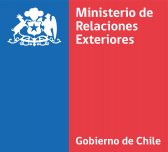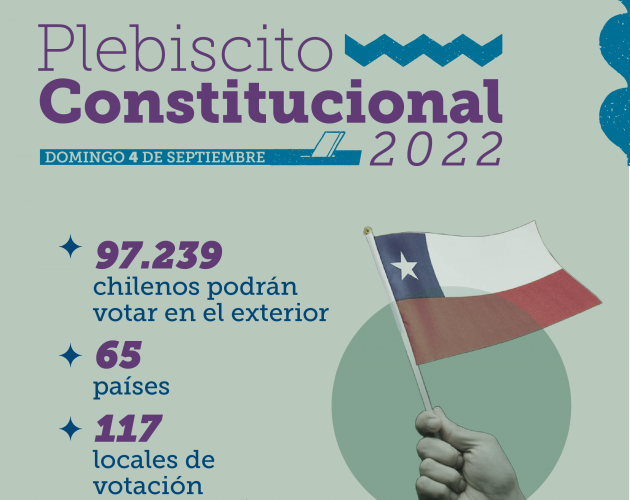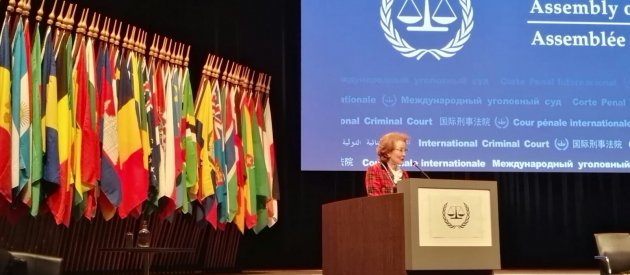Acreditación del primer embajador residente de Guyana ante CARICOM
El Embajador Claudio Rojas Rachel fue el miércoles 6 de abril de 2016 oficialmente acreditado ante la CARICOM tras una breve ceremonia en la que participaron el Secretario General Irwin LaRocque y Vicesecretario General Colin Granderson. Dicha acreditación señala la profundización de los vínculos entre la República de Chile y la Secretaría de la Comunidad de Caribe.
A continuación las observaciones hechas por ambos representantes en este evento histórico (en inglés solamente).
Intervention Ambassador Claudio Rojas Rachel at CARICOM´s Presentation of his Credentials
At the Eighth Heads of Government Conference of CARIFTA held in April 1973 in Georgetown, Guyana the decision to establish the Caribbean Community. In this historical moment the signature of the Caribbean Community Treaty common into effect in August 1973.
The CARICOM system of treaty entities, institutions, associated institutions and related entities had contributed in a solid manner in the process of the integration of the region, whereas the Secretariat plays a pivotal role in providing leadership and service, in partnership with Community institutions and Groups, “toward the attainment of a viable, internationally competitive and sustainable Community, with improved quality of life for all."
The decision in 1989 to establish the CARICOM Single Market and Economy (CSME) was a move to deepen the integration movement and to better respond to the challenges and opportunities presented by globalization.
Of particular importance is the right that the CSME grants to any CARICOM national to establish a business in any Member State and be treated as a national of that state.
This complements the opportunities which the CSME will provide for greater cooperation among businesses to improve and increase the quality and quantity of goods and services they produce and to do so at better prices.
The Community objectives defined as a core value to improved standards of living and work and the economic social and political integration of the Community, with the aimed of a vision and political will for a more efficient operation of common services and activities for the benefit of its peoples; accelerated promotion of greater understanding among its peoples and the advancement of their social, cultural and technological development.
In that context Chile is committed and willing to work together to facilitate a strong ties with all the nations of the Community and move forward our process for the promotion of the economic development and the well-being of our people.
Chile is one of the most open economies in the world with 25 trade agreements covering 64 countries. Our average tariff is less than 1 %. We are part of the 21 economies of the Forum of the Asian Pacific Economic Cooperation (APEC), instance to which Chile is a member since 1994 and that today occupies a prominent place in the economy and world trade: 40 per cent of the population of the world, 57 per cent of global GDP and 49 per cent of the global exchange.
On February 4, Foreign Minister Heraldo Munoz signed the Trans Pacific Partnership (TPP), which was named "the largest-ever free trade agreement", since the twelve signatory countries contribute 40% of the world's GDP and about 812 million inhabitants. Even though Chile has trade agreements with all of its members, its incorporation ensures a better commercial participation and the preservation of the markets which has strengthened since the 1990s. The TPP sets the highest standards to improve areas important for national development, such as: anti-corruption provisions, consistent regulatory competition, small and medium-sized enterprises, innovation, telecommunications and customs processes.
Chile is part of the process of globalization and our economy relies on foreign trade, whereas there is the need to improve our international insertion and bear in mind that somewhere in this way development still awaits us.
CARICOM-Chile mechanisms were first established and signed in Kingston, Jamaica, on May 13, 1996.
The objective was to promote and strengthen political, commercial, economic, scientific, technical and cultural cooperation in order to deepen relations between the Parties and coordinate their positions in the international fora.
Following this, further agreements were reached at the First CARICOM-Chile Joint Commission held in Santiago, Chile on June 7, 2003. This commission acknowledged the importance and significant contribution that the strengthening of ties between the respective nations could achieve.
There has since been a Second Meeting of the CARICOM-Chile Joint Commission, this time in Santiago, Chile during February 3- February 4, 2012.
These meetings reaffirmed each party’s firm commitment to the Principles and Purposes enshrined in the Charter of the United Nations, the Charter of the Organization of American States, the political will in favour of multilateralism and the fundamental principles of International Law, including respect for the sovereignty and sovereign equality of States, non-intervention and non-interference in internal affairs, banning of threat and the use of force in international relations, the respect for territorial integrity and the peaceful settlement of disputes.
Also we shared the same goals at the international arena and to work in a constructive manner towards the fulfilment of the Sustainable Development Goals, and the advancement of the United Nations Development Agenda; including the implementation of the outcome and commitments made at COP 21 in fighting climate change.
In working with CARICOM we are of the view that Cooperation and solidarity are important for regional efforts, and clear to that is to sustain political dialogue and cooperation among States as an effective strategy for the achievement of development objectives and greater well-being for our people.
Chile hopes to strengthen its relationship with CARICOM and the region. We have common goals and working together is the road ahead on achieving them.
At the IV CARICOM - Donor Forum (March 10-11,2016) we made clear that Chile is committed to supporting CARICOM and its member states in the execution of the 3 fundamental pillars that the organization conforms nowadays:
- The implementation of a strategic plan
- The reform process and;
- The implementation of a program of activities defined by priority areas identified by CARICOM
On doing so, we would like to work together with the Secretariat on identified actions based on programs and specific cooperation - including those of its technical bodies - according to the priorities; where it is necessary to align and matching these elements of the priorities of CARICOM.
On a personal note, Mister Secretary General, in my diplomatic career I had the privilege of working in the multilateral field at the United Nations and also at the Asia Pacific Fora Secretariat (APEC), circumstances that made my accreditation to CARICOM so much more special for the opportunity to continuously work in issues related with economic and social development, and trade and international cooperation.
Thank you Sir.
Remarks BY THE SECRETARY-GENERAL CARIBBEAN COMMUNITY (CARICOM)
Ambassador Irwin LaRocque on THE occasion of the PRESENTATION OF CREDENTIALS BY HIS EXCELLENCY CLAUDIO ROJAS RACHEL PLENIPOTENTIARY REPRESENTATIVE (DESIGNATE) OF THE REPUBLIC OF CHILE TO CARICOM
GEORGETOWN, GUYANA
6 APRIL 2016
- Your Excellency Claudio Rojas, Plenipotentiary Representative of the Republic of Chile to the Caribbean Community;
- Noelle Plass of the Embassy of Chile;
- Ambassador Colin Granderson and other Members of Staff of the CARICOM Secretariat.
Excellency, it is with great pleasure that I welcome you as a member of the family on the occasion of the presentation of your Credentials accrediting you as Chile’s Plenipotentiary Representative to the Caribbean Community.
CARICOM attaches great value to the close and friendly relationship that we have forged with Chile over the past years. The common interests and positions that we share have been reflected in our discussions, either in bilateral meetings or in overlapping regional or hemispheric organisations, such as CELAC and the OAS. This relationship is underpinned by our engagements at the highest political levels. The Heads of Government of CARICOM and Chile have met and exchanged views, both in the Region and in Santiago.
I recall, with pleasure, my visit to your country in 2014, during which I had the honour of meeting Her Excellency President Michele Bachelet, among my many productive engagements.
Ambassador, as you are aware, our relations date back to 1996 when the signing of an Agreement on Scientific and Technical Cooperation paved the way for collaboration in a wide range of areas. Under this Agreement, Chile has provided technical assistance to the Member States of the Community and to the Secretariat, in the form of training courses in a number of areas.
These include Agriculture; Health and Nutrition; International Negotiations and Diplomatic Training; and Foreign Language Training for high school teachers, in trilateral collaboration with the Government of Mexico. I would like to assure you that these programmes are of great importance to CARICOM, and make a significant contribution to the Community’s efforts to boost its human resource capacity and expertise in these critical areas.
CARICOM and Chile have been co-operating in the crucial area of disaster management, through which your country has been sharing its high level of technical expertise with the Caribbean Disaster Emergency Management Agency (CDEMA). Further, there has also been extensive collaboration between Universities in Chile and the Seismic Research Unit at the University of the West Indies with respect to earthquakes, to which both our Region and Chile are prone.
The CARICOM-Chile Joint Commission established under the Agreement has not met for some time. It is my hope that, during your tenure, we can work together to facilitate the convening of this body with a view to reviewing and advancing our technical cooperation in the agreed areas.
We are also seeking to advance our trading relations. In that regard, a team co-ordinated by the Caribbean Agricultural Health and Food Safety Agency (CAHFSA) visited Chile last month. We await the report of this visit.
Excellency, in recent years, Chile has earned considerable visibility at the regional and international levels. The role of your country in international affairs has involved active participation in platforms for cooperation and development, as well as involvement in political dialogue in fora such as the OECD and the G20.
An issue that continues to preoccupy our Community’s attention is graduation, which removes access to concessionary development financing, based principally on the criteria of per capita income. There is a need for the criteria to be changed to take into consideration the economic and environmental vulnerabilities of SIDS. As we advocate for this change in approach by the developed countries, and by the international financial institutions, we look forward to Chile’s support for our position on this matter.
CARICOM greatly appreciates your country’s understanding of the issues facing Small Island Low-Lying Coastal Developing States (SIDS), such as ours. The statement made by your country acknowledging SIDS’ special needs and challenges at the Third International Conference on SIDS in Samoa, in September 2014, is testimony to this fact. It demonstrated a recognition of the vulnerabilities of SIDS and indicated Chile’s readiness to stand by this category of countries.
Within the Hemisphere, Chile has played a leading role in both CELAC and the OAS. On this note, I wish to place on record the strong support and facilitation that the Caribbean Community received from Chile during its Presidency Pro Tempore of CELAC in 2012, in particular the support for CARICOM to be represented on an expanded CELAC Troika, which is now the Quartet.
Excellency, your appointment is further evidence of the deepening and strengthening of CARICOM-Chile relations. I receive, with pleasure, your Credentials as the Plenipotentiary Representative of Chile to the Caribbean Community, and we at the Secretariat look forward to working with you in advancing those relations.
Thank you.





